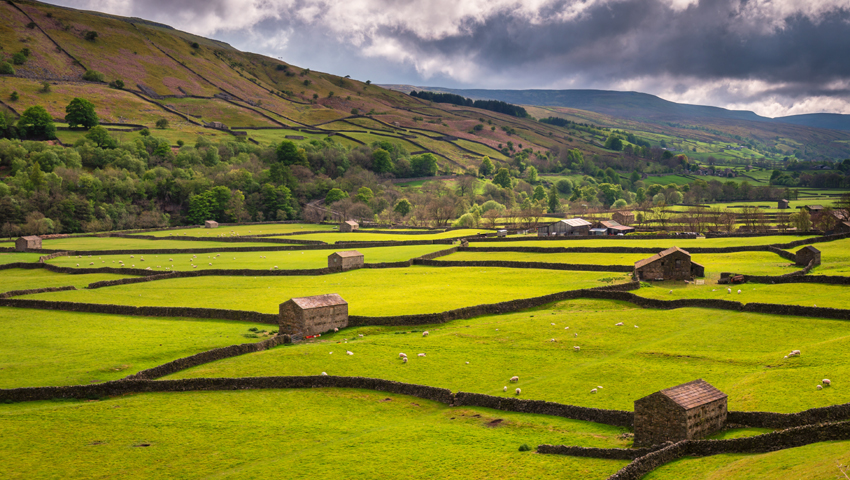IN AN article for Yorkshire Bylines, Dr Peter Gittins, farmer and expert in rural entrepreneurship addresses the complexities faced by farmers in England during their transition away from the basic payment scheme (BPS).
By 2028 EU-style farm subsidies will be completely removed. Gittins says “This is a major concern for many farmers, as funding under the common agricultural policy (CAP) has provided UK farmers with approximately £3bn per annum, making the CAP the single largest expenditure of the EU budget. The removal of this critical financial resource is a complex issue and will impact farmers differently.
He says that “Many average-sized farmers are reliant on these subsidy payments. In some instances, subsidies can comprise 90% of a farmer’s annual business profit. Many farmers make a net loss without subsidies, and the removal of them could lead to business collapse for some.”
However, he says that “The manner in which BPS payments were calculated favoured those with more land—the more land one has, the more entitlements and subsidies. Large landowners do best: entrepreneur James Dyson has received over £5mn in subsidy support payments alone.
“Smaller-sized farmers and tenant farmers, in particular, have been particularly constrained. As payments are area-based, smaller farmers receive less income. Tenant farmers often argue that subsidies have caused either inflated land prices or restricted access by landowners.
“The removal of subsidies could have unintended consequences, necessitating strategic planning to compensate for income loss. Farm entrepreneurship strategies will likely play an important role in helping farmers respond effectively to compensate for the loss of this critical financial resource. Diversification could be a suitable choice for some, both within and outside of agriculture.
“Farmers need to assess their land types, explore the various options under each scheme, and evaluate how well their land aligns with these new schemes. This becomes even more complicated when many farmers are already in existing countryside stewardship agreements (with many extended for a further five years). Conflicts can arise between the existing and new schemes.
“Moreover, not all farmers possess the required skill sets, necessitating the outsourcing of such activities to land agents, often incurring excessive costs. Misunderstanding information can also have consequences, leading to penalties and fines – something we have experienced.
“While many farmers are approaching change with a positive mindset and are adapting as best as they can, the Farming Community Network (FCN) is aware that ‘information overload’ can be a challenge.
“Important information is often written academically and can be difficult to access unless you know where to look; or it requires a strong familiarity with how to use the internet to find exactly what you need. FCN regularly hears from farmers who are worried about the future, and the charity plays an important role in ‘walking with’ people to help them find a positive way forward. FCN has collaborated with researchers at Leeds Business School to greater understand the challenges facing farmers.
“Net-zero [also] brings many uncertainties for farmers. What does this national commitment truly entail for farmers, and how will it affect them at the farm level? This is where farmers require clear guidance from rural policymakers.
“Some farmers have raised concerns over government trust, expressing worries about how the UK government will meet these emissions targets. The UK government should support farmers by making their message clearer, stating that meeting net-zero will not put farming, specifically livestock businesses, at risk. The loss of the small family farm is a concern. Since 2005, we have lost 5.3 million farming businesses in Europe.
“Investment costs are both concerning and uncertain. ‘You can’t go green if you’re in the red’ is a key message echoed among farmers. No farm will put itself out of business in the name of environmentalism. Farms are businesses at the end of the day and have to balance competing economic, environmental and social issues. But in reality, few farmers know just how close they are to achieving net-zero or if the measurements will change in the coming years. This makes strategic planning difficult.
“There are financial opportunities associated with net-zero, such as renewable energy diversification, new options under ELMs tiers, alongside opportunities to farm with fewer inputs and enhance productivity gains. The financial benefits are an additional advantage if it means we will have a positive impact on the climate crisis, resulting in fewer weather disasters.”
Gittins says that for him “The most fundamental question is: How will ELMs be applicable to all the different types of farmers?
“This is important because farmers do not have to engage; ELMs is a choice. But Defra has high ambitions, wanting 70% of farmers in SFI by 2028. A lack of engagement with the schemes could result net-zero ambitions falling short. Defra needs to recognise the heterogeneous nature of farmers and incorporate options for all types of farmers, not just financially rewarding environmental sustainability.
“Farmers I have spoken with call for more options under SFI that reward social and culturally important farming practices, linking to the sixth public good of enhancing beauty, heritage, and engagement with the natural environment.”
Neither is Gittins convinced that progressive reductions were the best course of action, especially for farmers who are already struggling financially. “George Eustice said, ‘We should not cling on to the sinking ship that is the CAP’. But where are we headed instead? If the CAP is akin to a sinking ship, as Eustice states, does that imply that the agricultural transition plan is the life raft? A punctured raft slowly losing air (subsidies) as time passes for some? And are ELMs the island spotted in the distance, and is that island a paradise or a place of the unknown?
He concludes that “As farmers navigate the complexities of transitioning to ELMs and embracing the path to net-zero, it is essential to ensure inclusive and flexible schemes that reward diverse farming practices, preserve social and cultural values, and provide financial stability, ultimately leading to a sustainable and resilient agricultural sector.”
